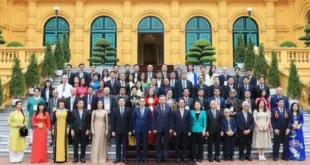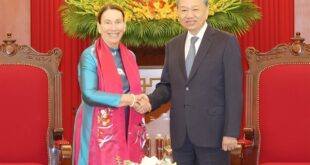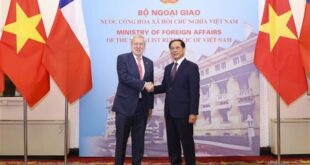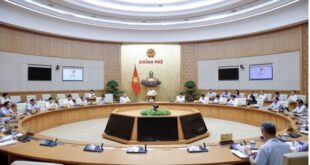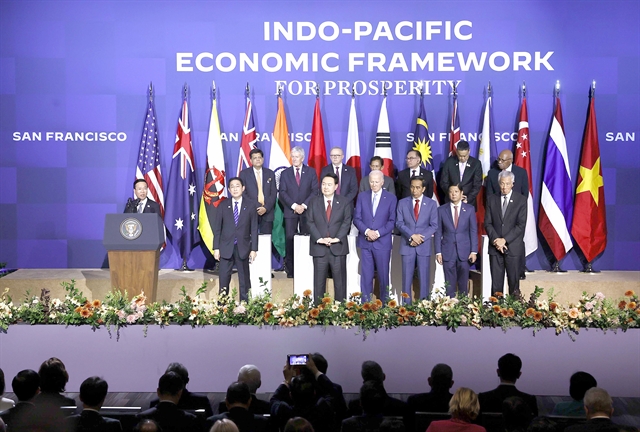
|
| Vietnamese President Võ Văn Thưởng addressed the meeting of leaders of the Indo-Pacific Economic Framework for Prosperity (IPEF), in San Francisco, the United States, November 16, 2023. — VNA/VNS Photo Thống Nhất |
HÀ NỘI — When taking the position as one of the 14 founding members of the Indo-Pacific Economic Framework for Prosperity (IPEF) launched by US President Joe Biden in May 2022, Việt Nam has shown the world its ambitions beyond mere economic gains to pursue wider market access and reduced tariffs.
Joining IPEF, the new high-standard economic cooperation framework with the participation of strong powers like the US and other countries in the Indo-Pacific could help Việt Nam overcome numerous challenges posed by the sluggish global economy, says Carl Thayer, Emeritus Professor at the University of New South Wales (Canberra).
“Việt Nam will face the risk of lagging behind unless it seizes the opportunity to join the IPEF and strengthen its capabilities, especially in the context of the fourth industrial revolution, digital economy and evolving supply chains,” Professor Thayer stressed.
In addition, collaborating with the US could potentially facilitate or contribute to Việt Nam’s attainment of market economy status, which it has yet to receive and thus, the IPEF would be a boon for Vietnamese goods, making them even more affordable in the US market, according to the professor.
Professor Stephen Nagy at the International Christian University (Tokyo) shares Thayer’s view and also highlights further the significance of the IPEF in strengthening intra-ASEAN integration, as Brunei, Indonesia, Malaysia, the Philippines, Singapore and Thailand are already the signatories to this framework.
Apart from increasing trade exchanges among ASEAN member states, and promoting the sharing of norms for trade and economic engagement within the bloc, IPEF would help Việt Nam address many emerging issues such as climate change, supply chain resilience, clean energy transition and even anti-corruption.
In November 2023 in San Francisco, President Võ Văn Thưởng made clear in his address at the APEC dialogue’s discussion session that Việt Nam considered climate change response a top priority in the national development policy and the country has strongly committed to net-zero emissions by 2050, methane emission reduction, forest protection and clean energy transition.
IPEF’s four key pillars fit Việt Nam’s ambitions perfectly.
IPEF’s clean economy pillar, with the participation of two green technology powerhouses the US and Japan, has appeared very attractive to Việt Nam as it will help the country speed up its green transition to establish a more environmentally sustainable, efficient and resilient economy, given the fact that Việt Nam is highly vulnerable to climate change, with the hardest-hit area being the Mekong Delta, Professor Nagy points out.
According to the World Bank, without adequate mitigation measures, Việt Nam could face significant economic losses due to climate change. By 2050, the country could experience an annual loss of approximately 12-14.5 per cent of its GDP, while up to one million individuals could be exposed to extreme poverty by 2030.
Besides, joining the IPEF will create a platform for deeper cooperation among the signatories, which means it will offer opportunities to Việt Nam as a manufacturing hub in the global supply chain.
Amitendu Palit, Senior Research Fellow at the Institute of South Asian Studies at the National University of Singapore, says Việt Nam has emerged as a highly attractive destination for businesses operating in the Indo-Pacific region, particularly those from the IPEF member countries, who look at Vietnam as a favourable location for expanding their supply chain activities.
“Việt Nam’s ability to provide trained labour for specific industrial operations, an investor-friendly atmosphere and good foreign relations can make it a very important location for reorganisation of critical supply chains in the IPEF,” Palit assesses.
The engagement in IPEF, according to Professor Thayer, also opens up possibilities for Việt Nam to progress beyond its current role of assembling and packaging computer chips into semiconductors. In the next decade, the country can strive to become an innovator and leader in designing and adding values to computer chips.
Through IPEF, Việt Nam can gain access to expertise, technology, training, and legal frameworks, which will contribute to the enhancement of labour skills and technological capabilities.
Regarding the fair economy pillar of the IPEF, it will create a level playing field to promote transparency and equitable competition. This aspect will facilitate increased investment and enhance the competitive edge of participants.
Trần Thị Thuỳ Linh, a lecturer at the Diplomatic Academy of Việt Nam who has done substantive research on IPEF said that engaging in IPEF’s fair economy pillar could provide Việt Nam with opportunities for transparency enhancement, information exchanges, capacity building, and technical assistance, given that Việt Nam has long struggled to create an effective tax system and anti-corruption mechanisms.
In fact, Việt Nam has made significant progress in anti-corruption thanks to strong political determination. The country’s upward movement in the corruption perceptions index (CPI) report in 2022 by Transparency International indicates that Việt Nam’s efforts in combatting corruption have resulted in significant changes recognised by international experts. Việt Nam was one of the 25 countries that saw an improvement in the ranking, gaining three points and moving up 10 places compared to the previous ranking.
But experts acknowledge that there is still considerable work ahead for the country to catch up with this pillar. It requires additional time and effort to implement comprehensive reforms, strengthen regulatory frameworks, enhance top-to-bottom governance, and promote a level playing field for businesses.
IPEF: Forging a path ahead
In a nutshell, the US-led economic framework is to create a mechanism that ensures a shared high-standard environment and fosters mutual benefits for all members. But insiders warn interested countries that joining IPEF is like taking a plunge into the ocean where swimmers have to be strong enough to survive; to thrive in the global economy, strength and resilience are vital for all participants, and Việt Nam is not exempt.
Phan Cao Nhật Anh, Deputy Director General of the Việt Nam Institute of India and Southwest Asian Studies (VIISAS) under the Việt Nam Academy of Social Sciences (VASS), says Việt Nam’s engagement in the IPEF negotiations is aimed to mobilise optimal domestic and foreign resources for national construction and development, but the country must be prudent to ensure the new commitment is consistent with national interests and comprehensive development strategy.
According to Nhật Anh, much progress has been made so far in the US-led economic framework, with negotiations completed on three pillars of supply chain, clean economy and fair economy. However, a number of issues remain unresolved in the trade category such as the different interests of individual economies that require further active efforts to achieve consensus.
It will also be difficult to reach consensus with the IPEF partners if Việt Nam sets low standards for environment and labour issues. “It is crucial for Việt Nam to keep up its efforts to enhance labour quality and refine regulatory and institutional frameworks pertaining to digital trade,” Nhật Anh says.
Regarding the trade pillar of the IPEF, Professor Thayer says it holds a lot of unsettled issues, especially labour standards, environmental standards and compliance issues, not to mention the sensitive issue of determining the course of action if a member fails to fulfil their obligations.
He says labour and environmental standards are subject to mutual agreement. This implies a trade-off for mutual benefit. Since the IPEF is not a multilateral free trade agreement and the US is not offering market access, the US will need to offer attractive training, capacity building, technical assistance and infrastructure investment packages as incentives for countries like Việt Nam to cover the costs of domestic regulatory reform.
Professor Thayer suggests Việt Nam adopt a wait-and-see policy, while negotiating with other IPEF members, for a clarification from the US on how developing countries will be compensated for the costs of meeting high labour and environmental standards.
“The main issue for Việt Nam is to increase access to the US market either bilaterally or through the IPEF because the US is not a member of the CPTPP or the RCEP,” the Australian professor notes.
Bích Trần, Adjunct Fellow at the Centre for Strategic and International Studies (CSIS) in Washington, D.C., agrees with this point, saying it is challenging for countries to negotiate the trade pillar as they have diverse priorities and capabilities.
“Higher standards will increase the costs for businesses. Besides, without market access to the US, many countries do not see the incentive to conform to those standards,” Bích points out.
She recommends Việt Nam opt out of the trade pillar but join the other three, or consider higher labour and environment standards required under the trade pillar as a way to attract future investment and join the framework fully.
As the IPEF continues to evolve, it’s high time Việt Nam study the new mechanism thoroughly, consult and share information with relevant countries to facilitate the negotiation process and speed up the formation of a framework that will bring practical benefits to its people, and contribute to peace, stability and prosperity in the region and the world. — VNS
- Reduce Hair Loss with PURA D’OR Gold Label Shampoo
- Castor Oil Has Made a “Huge” Difference With Hair and Brow Growth
- Excessive hair loss in men: Signs of illness that cannot be subjective
- Dịch Vụ SEO Website ở Los Angeles, CA: đưa trang web doanh nghiệp bạn lên top Google
- Nails Salon Sierra Madre
 VnExpress News The News Gateway of Vietnam
VnExpress News The News Gateway of Vietnam
